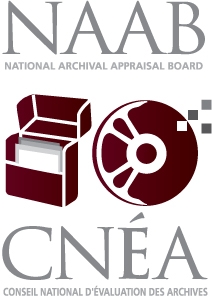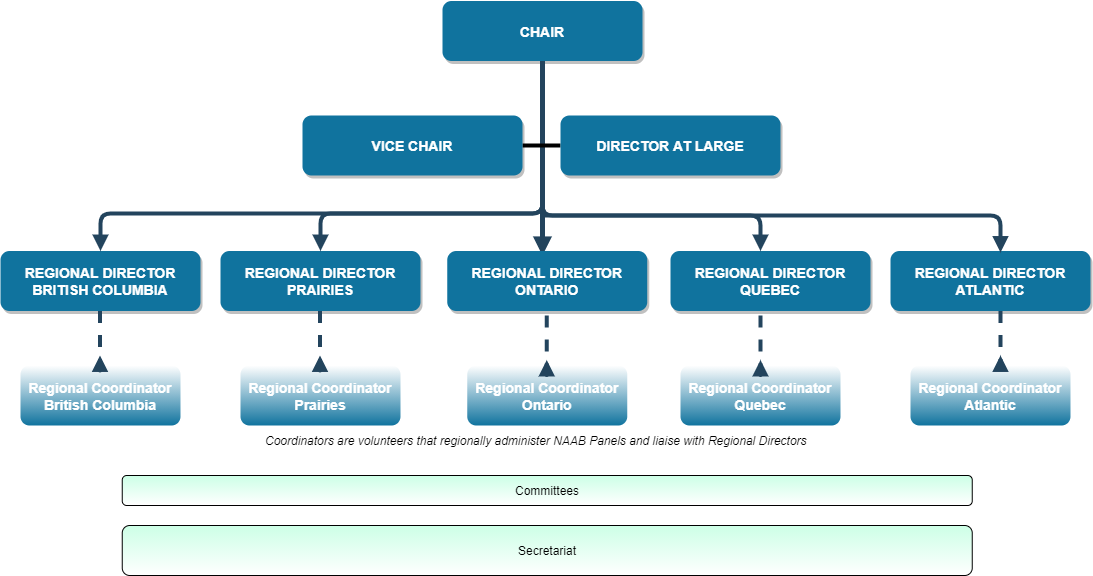 |
|
Governance / Direction
Who are we?
and two special advisors:
NAAB has undergone many changes in recent years. In March 2016, the Future of NAAB Working Group was established to review NAAB’s existing goals, strategies and organizational structure and determine future directions, explore opportunities and develop a framework that would realign NAAB’s organizational structure and business. Active for two years, the Working Group supported the NAAB Board of Directors by reflecting on NAAB’s history to develop a vision for the future of the organization. The work completed by the Working Group includes the development of a PNA competency framework, a Code of ethics and personal responsibility, a Membership structure and dues levels, and a pilot project for a Database of Past Appraisals. The Working Group also oversaw the amendments to the NAAB bylaws to comply with the new federal law requirements for not-for-profit organizations, preparing NAAB to become a vital and transparent organization, positioned to meet the demands for archival monetary appraisal in Canada. The Future of NAAB Working Group developed a new mission statement for NAAB: To foster public trust and build capacity for expert monetary appraisal services to Canadian institutions holding archival records. Following the work of the Working Group, a NAAB Transitional Board was elected in 2018 to lead the organization in the direction that was set by the Working Group. This Transitional Board was active from 2018 to 2022. The Transitional Board continued developing internal policies and the database project that was initiated by the Working Group, oversaw the development of a PNA Masterclass training program to standardize appraisal practices and expand membership, and supported the work of NAAB’s committees and working groups, including the Ad Hoc Committee on the Monetary Appraisal of Electronic Records. The Transitional Board provided leadership by responding to changes to the archival landscape and appraisal processes brought on by the COVID-19 pandemic, and by establishing priorities for the NAAB Board of Directors for 2022-2023. In 2022, an Annual General Meeting was held to elect members to the NAAB Board of Directors in line with the new Governance structure proposed by the Working Group and formalized by the Transitional Board
| Qui sommes nous? Les Règlements Administratifs (présentement disponible en anglais seulement).
et deux conseillers spéciaux :
Le CNÉA a été marqué par de nombreux changements au cours des dernières années. En mars 2016, le Groupe de travail sur l'avenir du CNÉA a été créé pour examiner les objectifs, les stratégies et la structure organisationnelle existants du CNÉA et déterminer les orientations futures, explorer les opportunités et développer un cadre qui réalignerait la structure organisationnelle et les activités du CNÉA. Actif pendant deux ans, le groupe de travail a soutenu le Conseil d'administration du CNÉA en se penchant sur l'histoire du CNÉA et en développant une vision pour l'avenir de l'organisation. Le groupe de travail a notamment développé un cadre de compétences pour les ECE, un code de responsabilité éthique et personnelle, une structure d'adhésion et des niveaux de cotisation, ainsi qu'un projet pilote de Base de données des rapports d’évaluations. Le groupe de travail a également supervisé les modifications apportées aux Règlements Administratifs du CNÉA afin de se conformer aux nouvelles exigences de la loi fédérale pour les organisations à but non lucratif, en vue d’assurer sa pérennité en tant qu’organisation vitale et transparente, positionné pour répondre aux demandes d’évaluation monétaire d’archives au Canada. Le Groupe de travail sur l'avenir du CNÉA a défini une nouvelle mission pour le CNÉA : favoriser la confiance du public et renforcer les capacités d'expertise en matière d'évaluation monétaire pour les institutions canadiennes détenant des documents d'archives. À la suite des travaux du groupe de travail, un Conseil d'administration intérimaire du CNÉA a été élu en 2018 pour diriger l'organisation dans la direction définie par le groupe de travail. Ce Conseil intérimaire a été actif de 2018 à 2022. Le Conseil intérimaire a poursuivi le développement de politiques internes et le projet de base de données initié par le Groupe de travail, a supervisé le développement d'un programme de Classe de maître d’ECE afin de standardiser les pratiques d'évaluation et d'augmenter le nombre de membres, et a soutenu le travail des comités et groupes de travail du CNÉA, y compris le Comité spécial sur l'évaluation monétaire des documents électroniques. Le Conseil intérimaire a fait preuve de leadership en répondant aux changements apportés au milieu archivistique et aux processus d'évaluation par la pandémie de COVID-19, et en établissant des priorités pour le Conseil d'administration du CNÉA pour la période 2022-2023. En 2022, une assemblée générale annuelle a été organisée pour élire des membres au Conseil d'administration du CNÉA, conformément à la nouvelle structure de gouvernance proposée par le groupe de travail et formalisée par le Conseil d'administration intérimaire.
|
NAAB Secretariat / Secrétariat du CNÉA |

